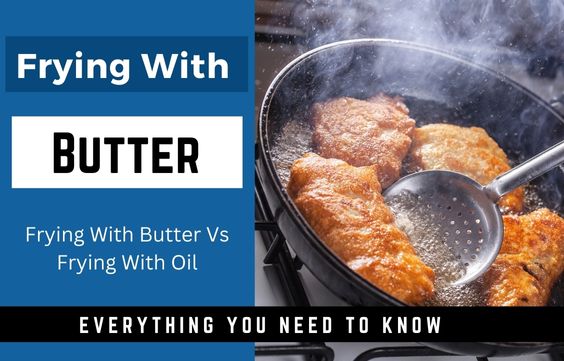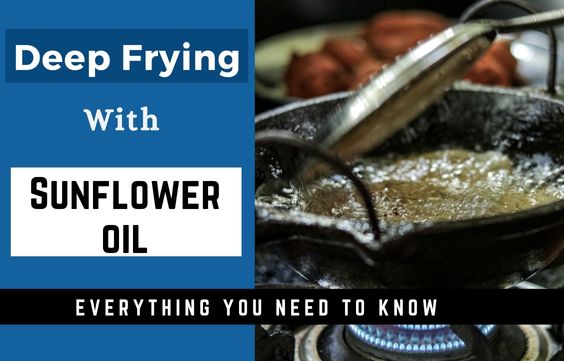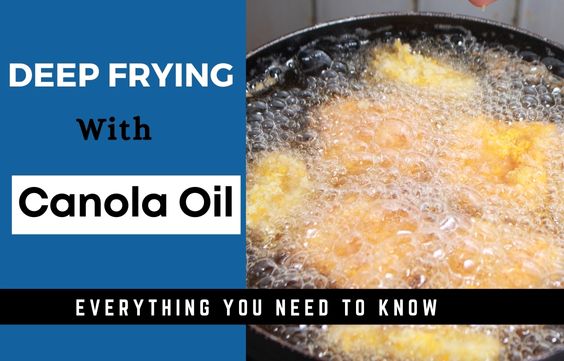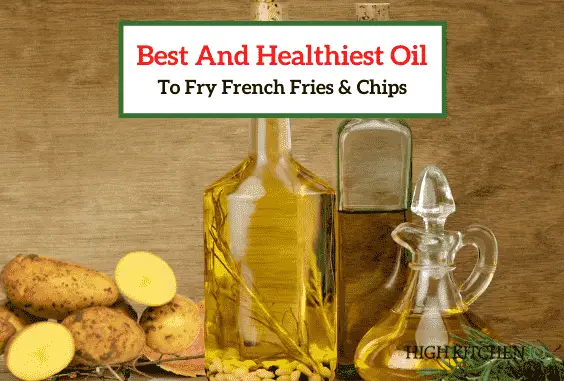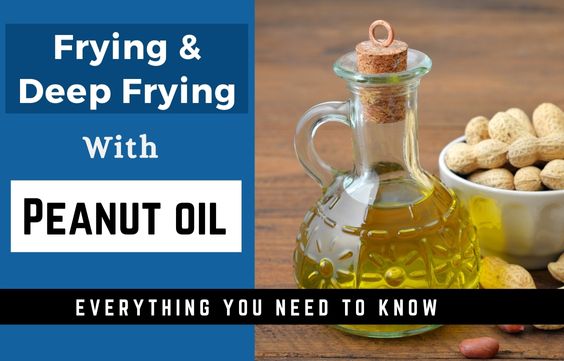Canola Vs Corn Oil: Which is More Healthy & Better to Cook
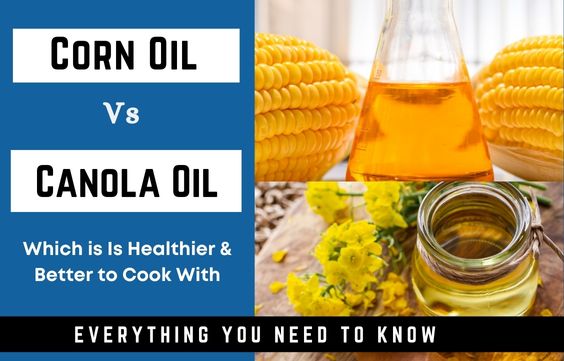
Canola oil is a vegetable oil that is produced from the Canola plant. This plant was created through the crossbreeding of the rapeseed plant in Canada.
On the other hand, corn oil is produced after the heavy processing and refining of the corn plant.
Now in this article, we are going to be comparing the two oils:
- In the first part, we are going to compare their cooking properties and flavor.
- And in the second part, we are going to explore the health and nutritional differences.
Cooking With Canola Oil Vs Corn Oil
Flavor Difference Between Canola Oil & Corn Oil
Canola oil has a neutral flavor, which means that it will not change or affect the general taste of any food that it is used to cook (even when deep fried).
On the other hand, corn oil has a very slight buttery flavor. However, it is generally considered to be one of the mildest flavored oil with the buttery notes barely discernable in some types of dishes.
Smoke Point Of Canola Oil Vs Corn Oil
The smoke point of canola oil is 400ºF while the smoke point of corn oil is 450ºF.
The higher the smoke point, the better the oil will hold up to deep frying and other cooking methods that require high heat.
Related Article: Frying with Butter: How to Correctly – Ultimate Guide
Which is better to deep fry with Canola or corn oil?
Many chefs and kitchen gurus prefer to use canola oil to deep fry foods.
Even though corn oil has a higher smoke point, canola oil has a neutral flavor which is preferred over the light buttery flavor of corn oil.
So even though corn oil might hold up longer in a deep fryer, canola oil still has an adequate smoke point to make it well suited for deep frying as well.
It also has the added benefits of a neutral flavor and better health benefits which make it the first choice.
Deep Frying With Canola Oil – Everything You Need to Know
Which is better for baking: Canola or corn oil?
The best oil for baking is canola oil.
Generally, vegetable oils are the chefs’ choice for baking goods, especially moist cakes. The neutral flavor and smoke point, as well as the health benefits and easy availability, make it the first choice in many kitchens.
Can you substitute corn oil for canola oil and vice versa?
Yes. You can use canola oil and corn oil interchangeably.
Canola oil and corn oil have similar nutritional values, a slightly different smoke point, and a slightly different flavor. So, if you do not mind a slight buttery flavor in some of your dishes, then these oils can be used in each other’s place if necessary.
Sunflower Oil For Deep Frying – Everything you need to know
Which Is Healthier: Canola Oil or Corn Oil?
While both oils could be better, canola oil is generally healthier than corn oil.
This is because canola oil has more monosaturated fats, which are said to be better for heart health.
It also has more omega-3 fatty acids. These are anti-inflammatory and may protect blood vessels from plaque buildup and damage which can cause a stroke or heart attack.
7 Best & Healthiest Oils to Fry French Fries & Chips
Which has more nutrients Canola Oil Vs Corn Oil
Canola Oil also is more nutrient dense when compared to corn oil. See table below. RDI means recommended daily intake.
| Nutrients | Corn Oil | Canola Oil |
| Calories | 122 per tablespoon | 124 per tablespoon |
| Vitamin E | 13% of the RDI* | 16% of the RDI |
| Vitamin K | 0.25% of the RDI | 8% of the RDI |
| Total Fat | 14 grams | 14 grams |
| Saturated Fat | 15% | 7% |
Health Benefits Of Canola Oil Vs Corn Oil
Based on the nutrition facts, canola oil appears to be more healthy than corn oil.
1- Heart Health
Canola oil tends to be better for your heart health when compared to corn oil, this is due to it having more Monosaturated fats.
Monosaturated fats, according to the American Heart Association, help to reduce the risk of heart attacks and strokes. Based on the nutrition facts, canola oil has almost 2 times the amount of monounsaturated fats in corn oil.
10 Best Healthy Substitutes for Coconut Oil -Baking & Frying
2- Cholesterol Levels
Both canola and corn oil can help with cholesterol but canola oil is better due to it having higher levels of Monosaturated fats and omega-3 fatty acid.
Now corn oil is way richer in phytosterols than canola oil. Phytosterols helps to lower the absorption of cholesterol. This prevents plaque buildup and blockages in the arteries that can cause heart disease.
However, researchers believe that since Canola oil has more monounsaturated fats and more omega-3 fatty acids, it is still better at preventing heart disease in general.
Peanut Oil for Frying & Deep Frying: Ultimate Guide
3- Blood Pressure
Canola oil has more omega-3 fatty acids than corn oil. Omega-3 fatty acids are said to be better for lowering blood pressure and preventing plaque build-up in the arteries (which contributes to high blood pressure).
4- Brain Health
Omega-3 fatty acids help to improve blood flow to the brain and it helps to build and maintain brain and nerve cells.
They are very helpful for learning and memory. Canola oil has a higher omega-3 fatty acid content than corn oil, making it a better option for brain health.
Health Concerns for Both Canola Oil & Corn Oil
Both canola oil and corn oil have a high omega-6 fatty acid content, are genetically modified, and are highly refined. All of these characteristics have some cause for concern.
1- Too much Omega-6 Fatty Acids
Both canola oil and corn oil are high in omega-6 fatty acids. While omega-6 fatty acids are important for certain healthy functions in the body.
Too much of it has been linked to chronic and inflammatory conditions like obesity, Alzheimer’s disease, and even depression. Western diets tend to be too high in omega-6 fatty acids already and adding either of these oils to that diet may make it worse.
2- Genetically Modified
Both canola and corn have been genetically modified to add or remove certain properties to make them more suitable for the consumer markets or consumers themselves. For example, both canola and corn are genetically modified to make them resistant to herbicides and pesticides.
However, even though many regulatory bodies consider GMO foods to be safe, many people are worried about how they might affect the environment, human health, agricultural contamination, property rights, and food safety.
3- Highly Refined
Both canola oil and corn oil are highly refined. Both processes require high heat, exposure to certain chemicals, and other treatments that make them RBD oils (refined, bleached, and deodorized oils).
This refining process markedly decreases the nutrient content of the oils and makes them more prone to oxidization. Oxidization puts you at risk for certain diseases like heart disease, diabetes, cancer, and Alzheimer’s disease.
Sources:
Corn Oil – an overview | ScienceDirect Topics
Canola oil: Benefits, risks, and alternatives
Corn oil Facts, Health Benefits and Nutritional Value
Is Corn Oil Healthy? Nutrition, Benefits, and Downsides
Corn Oil vs. Canola Oil | livestrong
The Best Oil for Cooking – What Types of Cooking Oil Are Healthiest | Live Science
